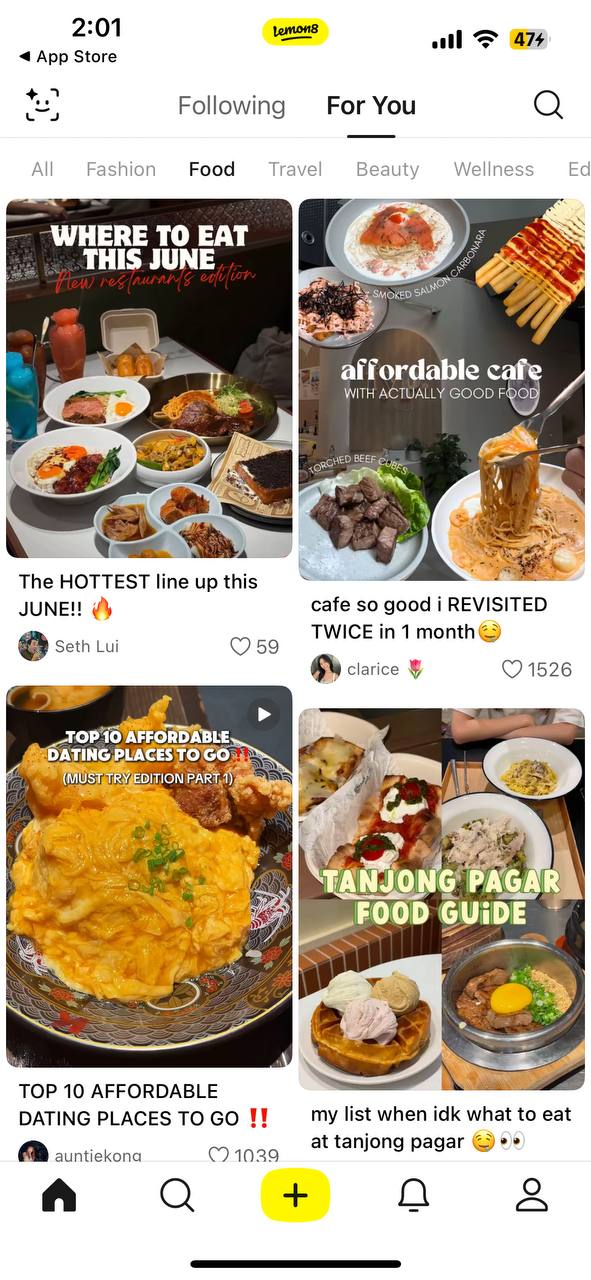ByteDance has already made a huge mark in the social media landscape with TikTok, but another platform launched by the tech giant in 2020 has been quietly gaining momentum in recent years: Lemon8.
Branded as a lifestyle app, it is especially popular among Millennials and Gen Zs, who you’ll find sharing personal stories, lifestyle tips and candid moments from their daily lives on the platform. It’s a digital platform that feels less chaotic and more curated, centred on authenticity and community.
In the last quarter of 2024 alone, Lemon8 saw over 16 million monthly active users across both iOS and Android—and at the time of writing, it’s ranked fourth in the Lifestyle category on App Store and sixth on the Play Store.
Could Lemon8’s rise signal a new trend in social media? One that values slower, more intentional content and community over virality?
Fostering genuine connection
At first glance, Lemon8 seems like a cross between Pinterest and Instagram. Like these platforms, it leans heavily on visual content with carousel-style photo posts that users (aptly called Zesties) can save into customisable collections.
But as you spend more time on the app, you’ll notice it functions very differently.
Unlike most social media platforms that allow for private chats, there are no DMs on Lemon8; instead, it enables users to interact solely through comments, fostering open, public conversations on posts.
From my time browsing the app (I’ve used it since the start of the year), the comment sections always felt warm and encouraging, with Zesties often exchanging supportive words rather than criticism.
This openness has also made users feel more comfortable sharing personal stories—often through long-form, diary-like captions—creating a space that feels less performative and far more genuine.
There’s also no downvote button, unlike platforms like Reddit or YouTube, which helps limit negativity and reduces the risk of dogpiling or creator shaming.
When you compare Lemon8 to other social media platforms, the difference is striking.
Most major platforms today are fraught with hate comments and anonymous trolling. Users hide behind alternate accounts to unleash harsh criticism, sparking unnecessary comment wars over everything from politics to petty influencer drama.
On top of that, these platforms can feel like echo chambers, amplifying divisive views.
Ultimately, these platforms often reward performative content and provocative “hot takes,” pushing creators to prioritise shock value over substance.
They tend to gain more views and likes by creating viral content centred around their opinions, especially contentious ones, or by asserting that their ideas are the absolute truth—sometimes by tearing others down in the process.
It’s a model built for virality, not authenticity. And for many users, including myself, it’s emotionally exhausting.
Lemon8 feels like a breath of fresh air in comparison.
There’s something for everyone
Lemon8 is undoubtedly wholesome, but that aside, what other factors could have led to its popularity?
For one, it is hyperlocalised. Although it is often compared to China’s Xiaohongshu (Little Red Book), a lifestyle-sharing platform originally founded in 2014 that has mainly Chinese content, Lemon8 automatically adapts its default language based on the user’s country, making it far more accessible to international audiences.
It leverages ByteDance’s artificial intelligence (AI) technology to personalise content based on user preferences and regional trends.
On the creator side, AI-powered tools make content creation more seamless, offering auto-captioning, built-in templates, and text overlays to help users polish their posts with minimal effort.
With users feeling more open and comfortable on the platform, Lemon8 offers a wide variety of content, which is sorted across 15 categories—from beauty and wellness to travel and even tech—making posts easy to search and discover.
The platform’s “Following” and “For You” tabs (similar to TikTok’s layout) let users toggle between curated content and creators they follow.
There’s something for everyone on Lemon8, which might also explain why Lemon8’s user base is almost evenly split, with 54% female and 46% male users.
This stands in stark contrast to the gender disparity seen within the social media apps of its like—for instance, 70% of Pinterest users identify as female, while two in three users on Reddit are male.
Nothing is ever perfect
But of course, no social media platform is perfect.
Amid the majority of wholesome content, I’ve noticed a minority of users creating clickbait posts, often using flashy templates and misleading titles to chase engagement, like this one:
Especially with Lemon8’s array of AI tools, it’s now easier than ever to generate captions and templates and produce low-effort, high-impact visuals that lure users in but ultimately fail to deliver value.
These posts typically offer little substance and leave readers feeling like their time was wasted. Fortunately, they remain few and far between on the platform from what I’ve observed, and the community seems self-aware enough to resist that kind of culture, at least for now.
Lemon8 may not have the cultural dominance of TikTok just yet, but it’s carving out a space for something that feels increasingly rare in the social media landscape: sincerity and community.
In a time when social feeds are saturated with performative content and divisive opinions, it offers an alternative, a place to simply share, connect, and be real.
And that, perhaps, could propel it to become the next big social media platform.
Featured Image Credit: Lemon8/ Shutterstock.com
